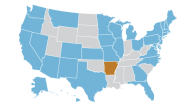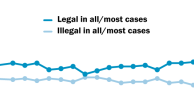Most Americans say the Earth is getting warmer, including a narrow majority (53%) who say it is mostly because of human activity, such as burning fossil fuels. Most also view global climate change as an extremely or very serious problem. Assessing potential consequences, 62% foresee rising numbers of extreme weather events, and 58% think an increase in refugees and displaced people is likely within the next 30 years because of global climate change. In addition, 54% expect food and water shortages, and 46% expect climate change to impact the quality of life.
There is a consistent pattern by religious group on these and other questions about climate change. In general, evangelical Protestants tend to be the most likely of all major U.S. religious groups to express skeptical views. For instance, about a third of evangelical Protestants say the Earth is getting warmer mostly due to human activity (32%), while similar shares say the Earth is getting warmer mostly due to natural patterns (36%) or that they are unsure or not convinced the Earth is getting warmer (32%). Meanwhile, members of non-Christian religions and people who do not identify with any religion – particularly self-described atheists and agnostics – consistently express the highest levels of concern about climate change. Other Christian subgroups, such as Catholics, generally fall somewhere in between.
These patterns are heavily influenced by politics. Evangelical Protestants largely identify with the GOP, and Republicans are less likely than the overall public to say the Earth’s warming is mostly caused by human activity. Evangelicals and Republicans also are less inclined than the general public to see climate change as a serious problem, as well as to say various negative consequences are likely to occur in the coming decades because of global warming. Meanwhile, atheists and adults who identify with other, non-Christian religions are mostly Democrats, who tend to be much more alarmed about climate change and supportive of government actions to combat it.
Those who do not think climate change is a serious problem offer several reasons for their views. Among the five options provided in the survey, two of the most commonly cited reasons are that there are much bigger problems in the world today and that God is in control of the climate.
Another possible reason evangelical Protestants stand out in their views on the climate is that they are the most likely of the major U.S. religious groups to say that when Americans make decisions as a country, we should value the same things that were important to generations that came before us (63%). By contrast, majorities of other groups agree with the notion that we should consider things that previous generations did not think about; half of evangelicals say the same.
This chapter explores these and other questions about climate change by religion.
Is the Earth warming, and is it a serious problem?
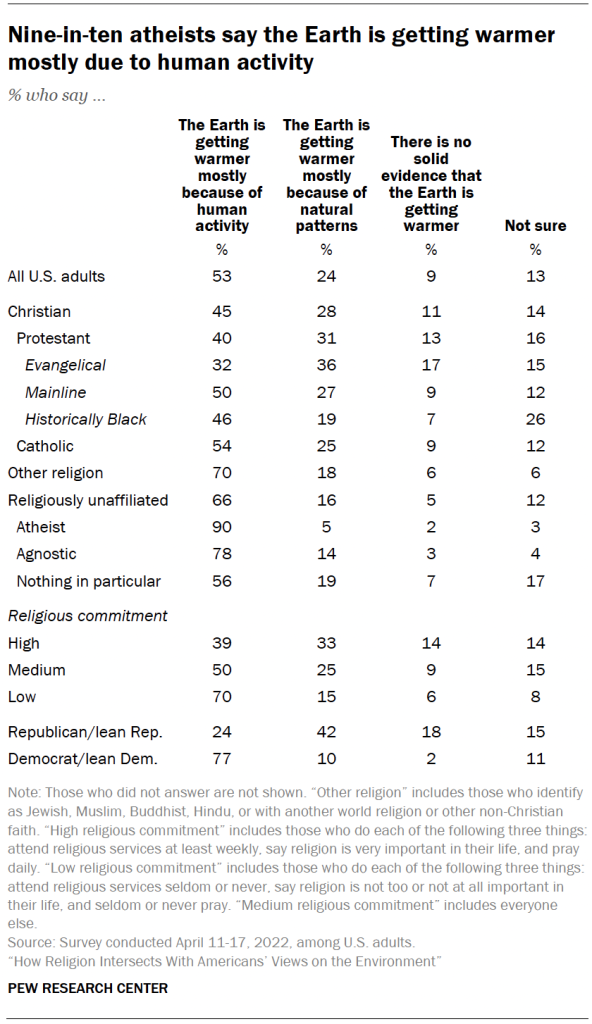
About three-quarters of Americans say the Earth is getting warmer, including 53% who say it is mostly because of human activity, such as burning fossil fuels, and 24% who say it is mostly due to natural patterns in the Earth’s environment. About one-in-ten Americans (9%) say there is no solid evidence that the Earth is getting warmer, and 13% say they are not sure.
Nine-in-ten atheists say the Earth is getting warmer mostly due to human activity, as do 78% of agnostics. Evangelical Protestants are the least likely to express this view (32%).
Americans with lower levels of religious commitment (70%) are much more likely than those with medium (50%) or high (39%) levels of religious commitment to say the Earth is getting warmer mostly because of human activity.
Democrats are about three times as likely as Republicans to say the Earth is getting warmer mostly due to human activity (77% vs. 24%). A plurality of Republicans (42%) say the Earth is getting warmer mostly due to natural patterns, compared with one-in-ten Democrats who say this. And roughly one-in-five Republicans (18%) say there is no solid evidence that the Earth is getting warmer, compared with only 2% of Democrats.
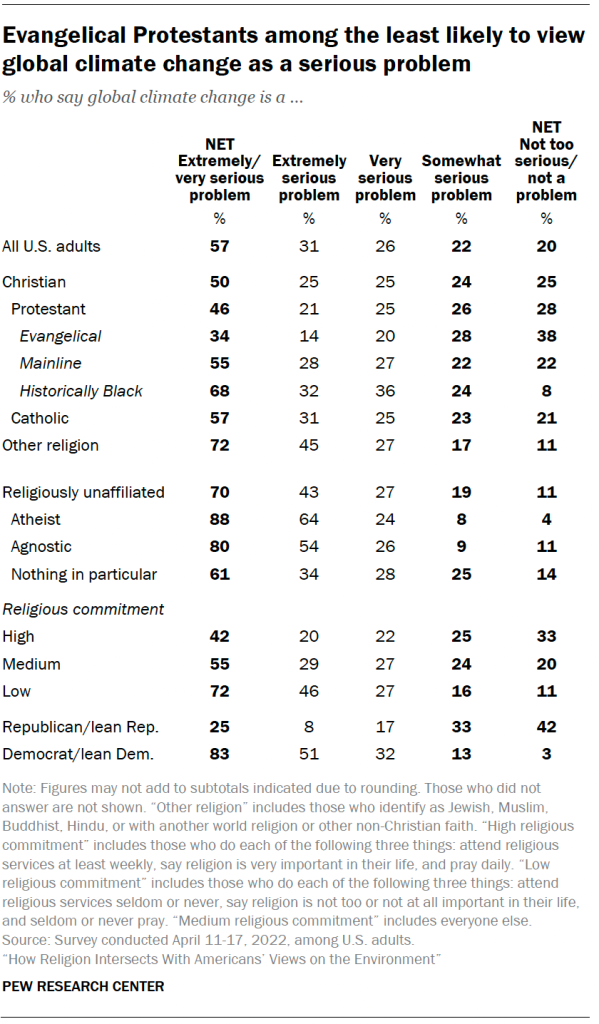
A majority of Americans (57%) view global climate change as an extremely or very serious problem. About one-in-five see it as a somewhat serious problem (22%), while a similar share say it is not too serious or not a problem at all (20%).
Most members of non-Christian religions (72%), religious “nones” (70%) and members of historically Black Protestant churches (68%) view global climate change as an extremely or very serious problem, and majorities of Catholics (57%) and mainline Protestants (55%) share these views. Evangelical Protestants, meanwhile, are the least likely to view global climate change as extremely or very serious (34%) and the most likely to say it is not a serious problem (38%).
Regardless of religious identity, about seven-in-ten U.S. adults with low levels of religious commitment say climate change is at least a very serious problem, including a plurality who say it is an extremely serious problem (46%). People with high levels of religious commitment are the least likely to say global climate change is extremely or very serious and the most likely to say it is not a serious problem.
Republicans and Democrats strongly differ in their views about the seriousness of global climate change. The vast majority of Democrats (83%) view global climate change as an extremely or very serious problem, while only a quarter of Republicans share this view.
The 20% of Americans who say global climate change is not a serious problem were asked why they think this is the case.
Of the options offered, the most common reason (cited by 17% of all U.S. adults, including 86% of those who think climate change is not a serious problem) is that “there are much bigger problems in the world today.” About one-in-ten Americans say climate change is not serious because “God is in control of the climate” (11% of U.S. adults, 53% of those who say climate change is not serious) or that “climate change will not have a big impact on most people” (10% of U.S. adults, 48% of those who say climate change isn’t serious). Another 8% of all U.S. adults say they “don’t believe climate change is happening,” and 4% say climate change is not a serious problem because “new technologies will fix any problems caused by climate change.”
About four-in-ten Republicans (38%) say climate change is not serious because there are much bigger problems in the world today, compared with only 2% of Democrats who say this. And nearly a quarter of all Republicans (23%) say climate change is not a serious problem because God is in control of the climate, compared with 2% of Democrats.
Among religious groups, evangelical Protestants are the most likely to say climate change is not a serious problem for most of these reasons, including that there are much bigger problems in the world today (34% of all evangelicals) and that God is in control of the climate (29%). Likewise, across all religious identities, highly religious Americans are more likely than those with lower levels of religious commitment to say climate change is not a serious problem, especially because there are bigger problems in the world (30%) or because God is in control of the climate (27%).
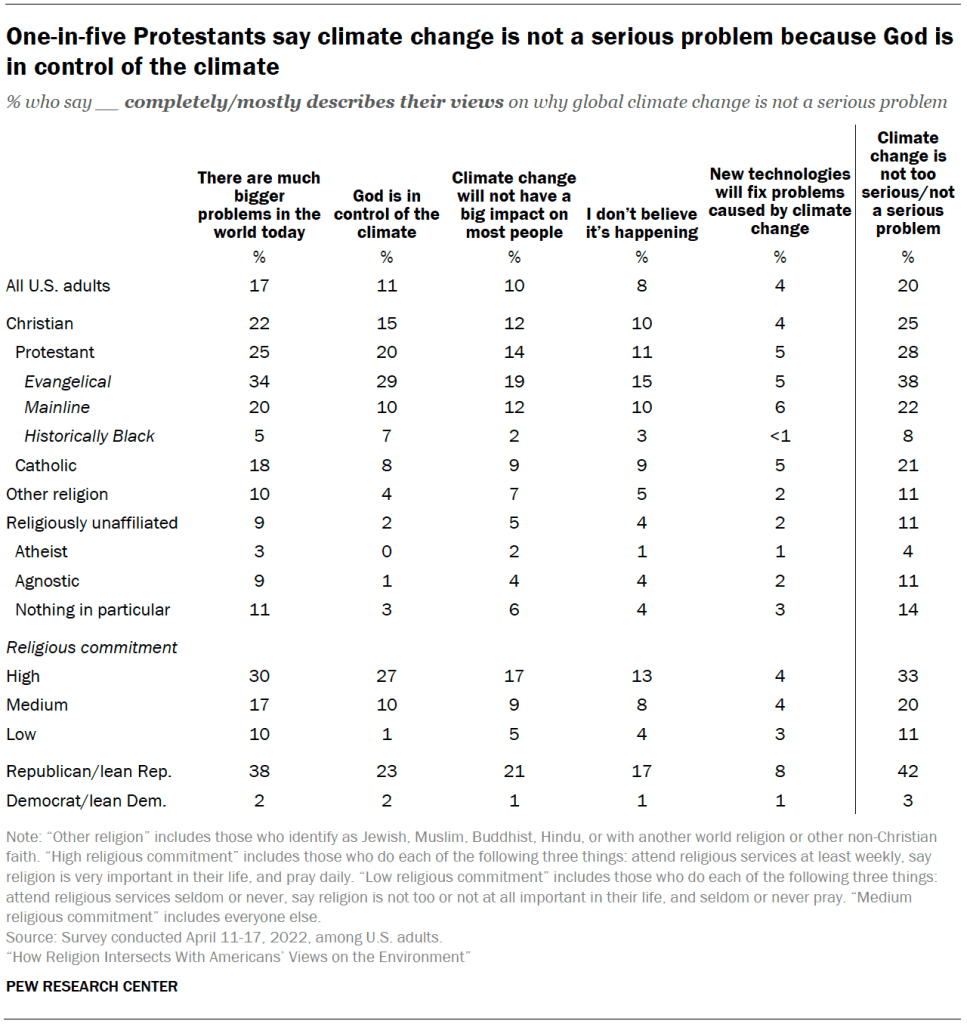
Views toward the future
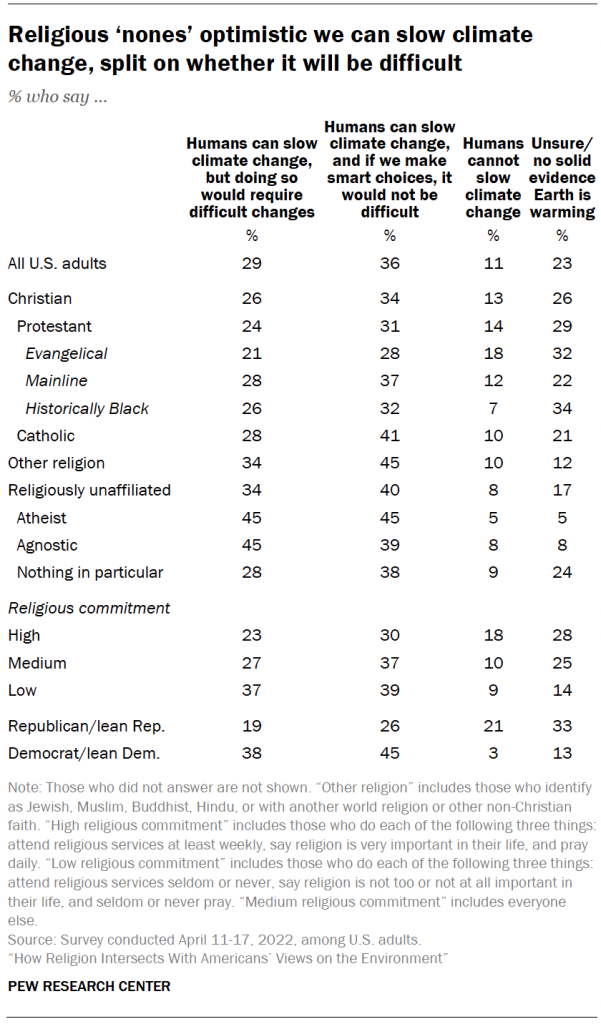
There also are disagreements on the effect that humans can have on slowing the future pace of climate change. Most atheists (90%) and agnostics (84%) say humans can slow global climate change, though they are somewhat divided over whether it will require making difficult changes, or whether it will not be too difficult as long as people make smart choices.
The most common view in most other religious groups is that humans can slow climate change, and that if we make smart choices, it would not be too difficult. One-in-ten U.S. adults (11%) say humans cannot slow climate change, with evangelical Protestants more likely than people in any other religious category to express this belief (18%). Republicans, the party with which most evangelicals identify, are significantly more likely than Democrats to say that climate change cannot be stopped (21% vs. 3%).
A majority of U.S. adults – including most people across a variety of religious groups – say society should focus both on slowing the progression of climate change and getting ready to deal with its effects, rather than just one or the other.
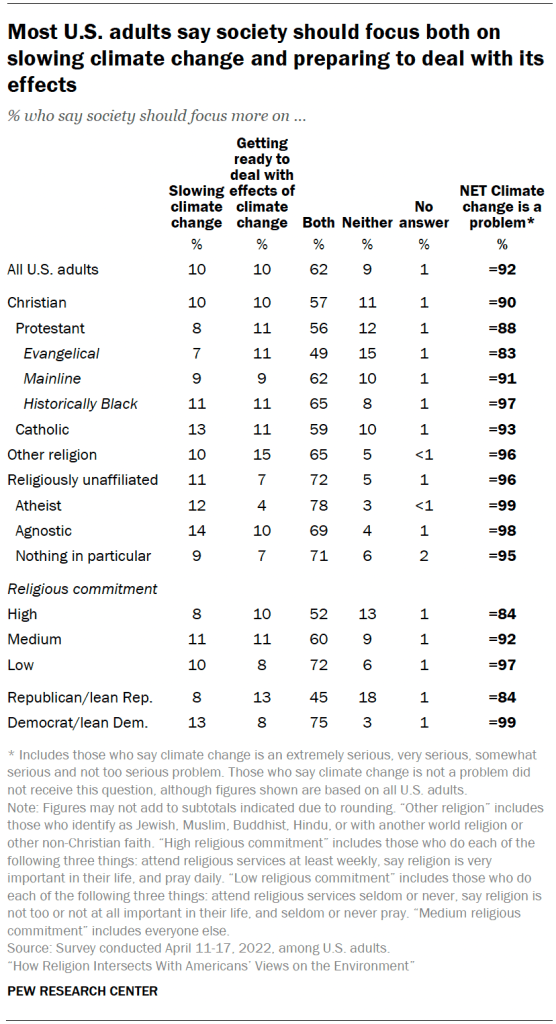
Evangelical Protestants are the group least likely to say that either or both of these efforts should be a priority, which is in line with their status as the group most inclined to say that neither should be a priority (15%) or that climate change is not a problem (17%). Still, about two-thirds of evangelicals say society should focus on slowing climate change (7%), getting ready to deal with the effects of climate change (11%), or both (49%).
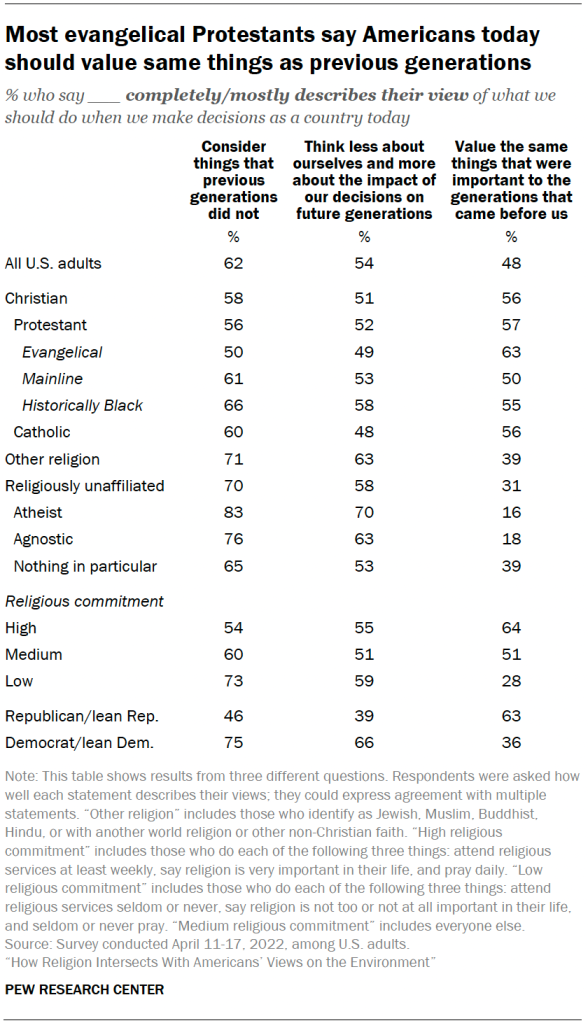
When asked whether we should value the same things that were important to the generations that came before us, Protestants (57%) – particularly evangelicals (63%) – as well as Catholics (56%) are much more likely than the religiously unaffiliated (31%) to say this completely or mostly describes their view. In fact, highly religious Americans in general, regardless of their religious affiliation, are much more inclined toward this perspective.
Conversely, the religiously unaffiliated (70%) are more likely than Protestants (56%) or Catholics (60%) to completely or mostly endorse the idea that as a country, we should consider things that previous generations did not think about. On this question, atheists (83%) and agnostics (76%) are the groups most likely to express this view, while evangelical Protestants (50%) are least likely to do so.
A similar pattern by religious affiliation applies to a question about whether we should think less about ourselves and more about the impact of our decisions on future generations, a frame that is often applied to the discussion around climate change. Seven-in-ten atheists say this completely or mostly describes their perspective, as do smaller majorities of agnostics (63%), members of non-Christian religions (63%) and Americans who belong to historically Black Protestant churches (58%). Roughly half of people in other Christian subgroups share this view. On this question, however, there is no clear pattern across different categories of religious commitment.
Most Americans expect negative consequences from climate change and environmental regulations within the next 30 years
The survey asked Americans how likely four potential outcomes are to happen within the next 30 years because of global climate change: more extreme weather events (such as tornadoes, flooding and droughts), an increase in refugees and displaced people, food and water shortages, and a lower quality of living. Most Americans think more extreme weather events (62%) and an increase in refugees and displaced people (58%) are extremely or very likely to happen, while 54% expect food and water shortages and 46% expect climate change to impact their quality of life.
The possibility of extreme weather events is the question on which the public is most sharply divided. About three-quarters of Americans who identify with non-Christian faiths (76%), seven-in-ten religious “nones” (70%) and two-thirds of members of historically Black Protestant churches (67%) think more extreme weather events are highly likely, compared with 45% of evangelical Protestants. Relatedly, Democrats are about twice as likely as Republicans to express this view (81% vs. 39%).
There are similar, although sometimes more muted, patterns on other potential consequences of climate change. But on all four of these questions, self-described atheists are more likely than members of most other religious identity categories to see these outcomes as very likely, as are those with low levels of religious commitment compared with highly religious Americans.
When including the shares who say these effects of climate change are somewhat likely, large majorities of Americans across all religious affiliation and commitment groups analyzed think all these outcomes are plausible.
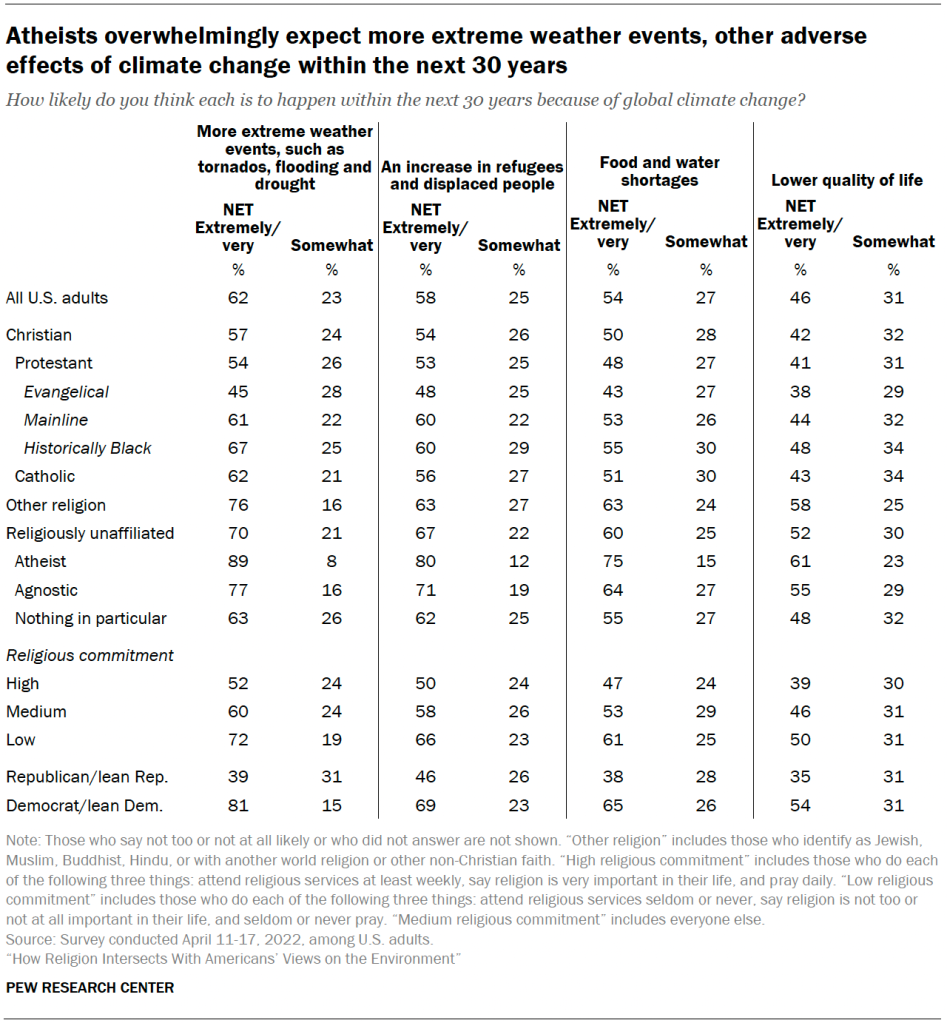

The survey also asked respondents for their expectations related to the country’s response to climate change – or lack thereof. About four-in-ten (39%) say it is extremely or very likely that the U.S. will overreact to climate change by creating many unnecessary environmental regulations, while about a quarter (24%) think this is somewhat likely and 36% say it is not too or not at all likely.
Evangelical Protestants are twice as likely as religiously unaffiliated adults to say the U.S. is extremely or very likely to overreact with unnecessary environmental regulations (56% vs. 28%). Republicans are more than three times as likely as Democrats to say this (64% vs. 18%).
Americans generally are less inclined to think the U.S. will lose its standing in the world for failing to take global climate change seriously (27% extremely or very likely), with atheists and agnostics most likely to hold this view (44% each).
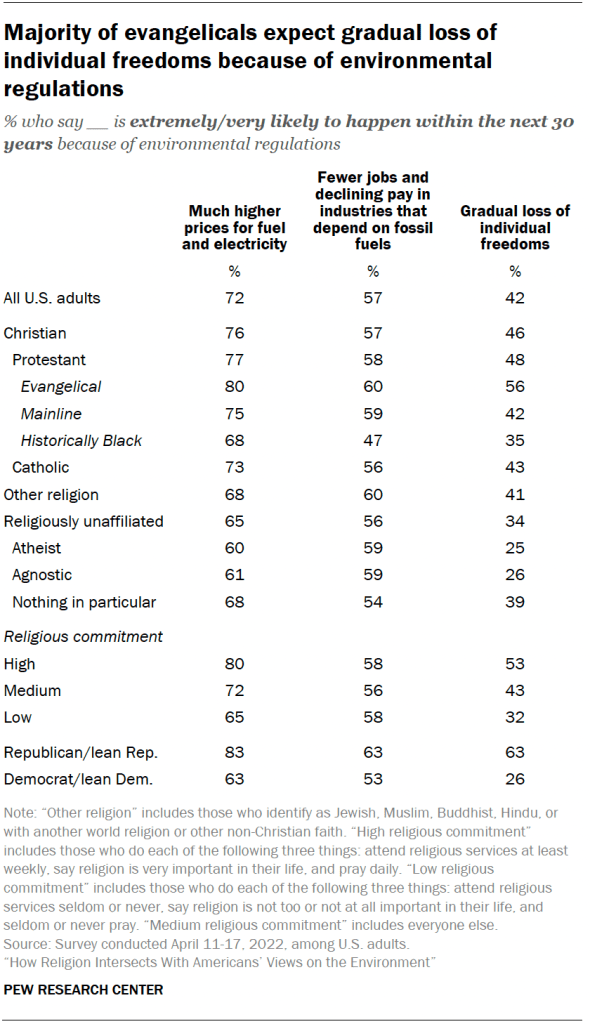
Most Americans (72%) expect much higher prices for fuel and electricity within the next 30 years due to environmental regulations. A smaller majority (57%) say that, for the same reason, it is extremely or very likely there will be fewer jobs and declining pay in industries that depend on fossil fuels. Fewer (42%) expect a gradual loss of individual freedoms within the next 30 years due to environmental regulations – although this is the majority view among evangelical Protestants (56%) and Republicans (63%).
Majorities of both major political parties and all religious groups analyzed anticipate much higher prices for fuel and electricity. And differences by religion on the question about jobs and pay are relatively modest.
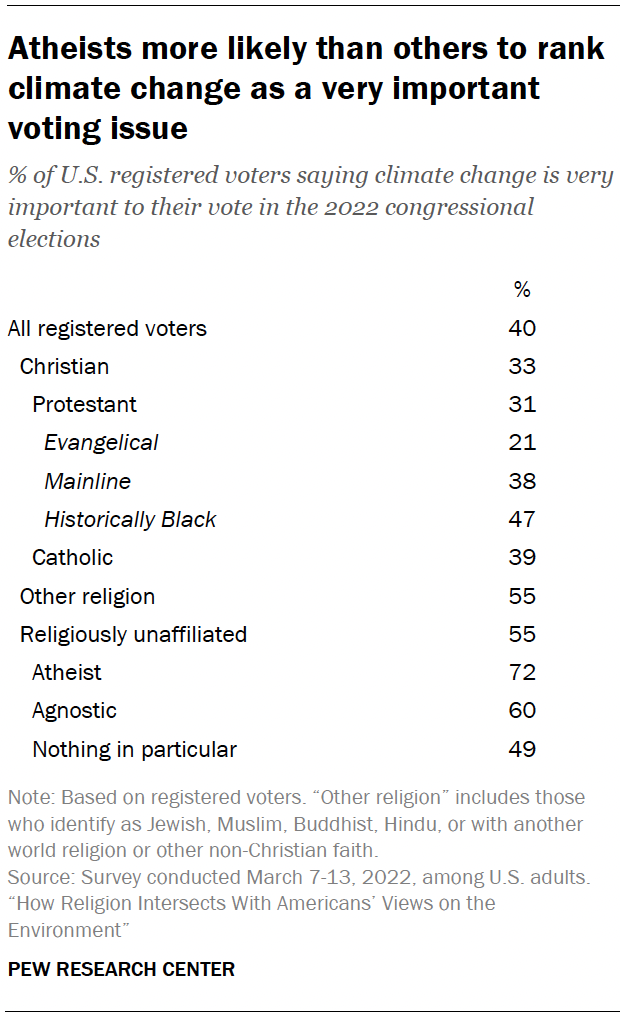
Climate change was a much more important voting issue leading up to the recent midterm elections for voters with no religion than for Christians. More than half of registered voters who are religious “nones” (55%) said in a March 2022 survey that climate change would be very important to their vote in the 2022 congressional elections, including seven-in-ten atheists (72%). Fewer Catholic (39%) and Protestant (31%) registered voters said it was a very important issue.
For more information on the issues voters considered very important closer to Election Day 2022, see the Center’s latest report on the topic.

